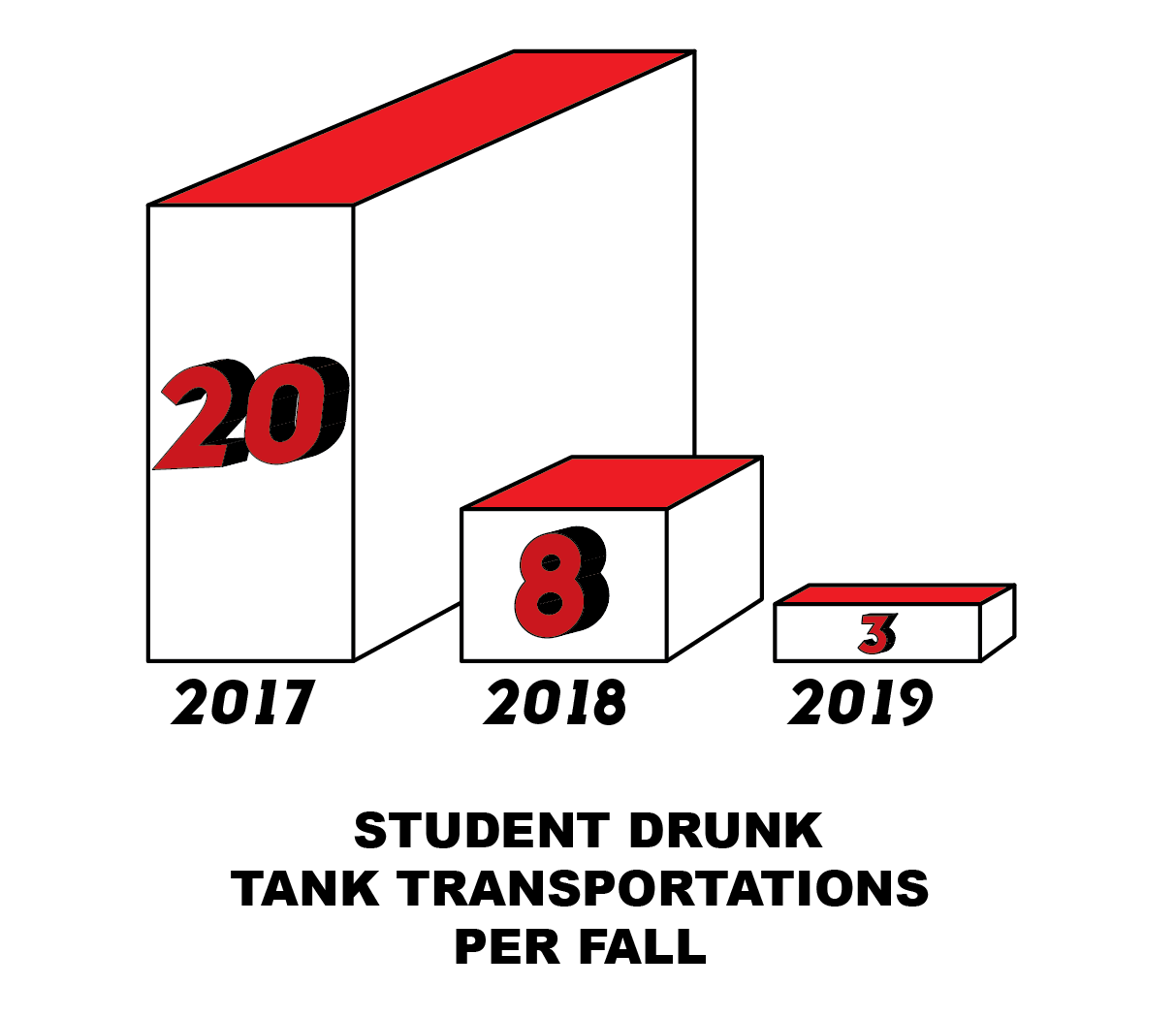Graphic by Quinn Butterfield.
In 2017, TUPD had transported 20 students to the detox center by the end of the fall semester. The number of transportations is down to three so far this semester. As for why there has been a decrease, opinions differ. Members of the Student Involvement staff connect the seemingly low detox center transportations to the impacts of the “Red Zone” initiative, but not all agree.
In August of this year, students involved in Fraternity and Sorority Life created an initiative that barred first-years from attending off-campus parties for the first three weeks of school. The ban, called the “Red Zone,” began on Aug. 21 and ended on Sept. 10.
The Red Zone was initially intended to combat sexual assaults prompted by national data showing high numbers of sexual assaults against first-years during the first weeks of college. Now, some staff believes there was another potential positive side effect of the ban: a lower number of students brought to the detox center.
Three people have been brought to the Center for Healthcare Services so far this semester. The detox center is a San Antonio-run facility where students spend the night to sober up before they are released. When students are found intoxicated but don’t need medical attention, they are taken to the detox center by TUPD.
Previous fall semesters show eight transportations in 2018 and 20 in 2017. Looking at these numbers, Jamie Thompson, director of Student Involvement, sees the correlation between the ban and the transportations.
“This isn’t research, so it’s hard to determine causation, but I think there’s certainly a correlation. A concerted effort on behalf of a student population who’s typically hosting events with alcohol, that they decided to make a really significant change in their culture and then we see that there are fewer students going to detox,” Thompson said.
David Tuttle, dean of students, also believes the low number might be related to the “Red Zone” ban.
“Anecdotally, it seemed to me that the number of transports and calls for intoxicated first-year students was significantly down compared to years past. Whether or not one can say that’s a cause-effect thing, I don’t know. It seemed related to me, but that’s more of an impression than anything,” Tuttle said.
Paul Chapa, chief of TUPD, feels that detox center numbers vary too much to consider this number particularly low.
“It varies from year to year, semester to semester, so it’s really hard to identify what that threshold would be. We try to educate our student body [to] help curve those numbers. It’s not anything we can predict. We can only hope for low numbers,” Chapa said over a phone interview.
The number also isn’t holistic. Chapa explained that there are various other alcohol-related incidents that can happen that will not be recorded as a trip to the detox center.
“Though we may not have a detox number, we may have had a student transported to the hospital for alcohol poisoning. There are a number of different variances. Rather than just detox, it could be a trip to the hospital. Is it normal that we would transport a couple of students early on in the semesters? Sure. Do we anticipate taking students to detox during the fall and spring semesters? Sure. Those things happen. It’s sad to say that maybe it’s expected, but it’s a safety precaution that we take for the students,” Chapa said.
According to Chapa, on a higher education campus, it is important to be prepared for incidents like this because they’re not just going to go away.
“Those numbers are important, and they do exist. They’re going to exist next semester, and they’re going to exist the semester after that. It’s one of those continuing things that we would expect to see. It’s going to [happen] because of our type of environment. I think tremendous opportunity has been taken to care for our students who make the decision or find themself in said situation,” Chapa said.
Now that the ban is lifted, fraternities are now hosting open events and parties. Fraternities are continuing to follow Safer Parties Initiative (SPIn) guidelines, according to Thompson. She hopes they continue their initiative of the “Red Zone.”













